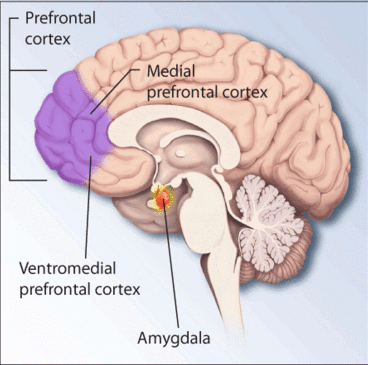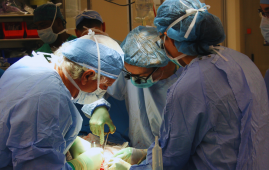

Attempts to identify the genetic causes of neuropsychiatric diseases such as post-traumatic stress disorder (PTSD) through large-scale genome-wide analyses have yielded thousands of potential links. The challenge is further complicated by the wide range of symptoms exhibited by those who have PTSD. For instance, does extreme arousal, anger, or irritation experienced by some have the same genetic basis as the tendency to re-experience traumatic events, another symptom of the disorder?
A new study led by researchers at Yale and the University of California-San Diego (UCSD) provides answers to some of these questions and uncovers intriguing genetic similarities between PTSD and other mental health disorders such as anxiety, bipolar disorder, and schizophrenia.
The findings also suggest that existing drugs commonly used for other disorders might be modified to help treat individual symptoms of multiple disorders.
“The complexity is still there, but this study helped us chip away at it,” said co-senior author Joel Gelernter, the Foundations Fund Professor of Psychiatry and professor of genetics and neurobiology at Yale.
For the study, the researchers analyzed the complete genomes of more than 250,000 participants in the Million Veteran Program, a national research program of the U.S. Veterans Administration that studies how genes, lifestyle, and military experiences affect the health and illness of military veterans. Among those participants were approximately 36,000 diagnosed with PTSD.
But instead of looking just for gene variants shared by PTSD patients, they also searched for variants that have been linked to three kinds of clinical symptoms that are experienced, to varying degrees, by those diagnosed with the disorder. These symptom groups, or “subdomains,” include the re-experience of a traumatic event, hyperarousal or acute anger and irritability, and the avoidance of people or subjects that might be related to past trauma.
While the researchers found underlying genetic commonalities among all three symptom groups, they also discovered specific variants linked to only one or two of the symptoms.
“We found a remarkably high degree of genetic relatedness between these three symptom subdomains. But we also wouldn’t expect them to be genetically identical, and they are not,” Gelernter said. “We found biological support for different clinical presentations of PTSD.”
The research also showed that some of these variants found in subgroups of patient symptoms are also linked to other disorders such as major depression. The results suggest drugs used to treat other disorders might also help treat PTSD.
“Our research pointed to some medications that are currently marketed for other disease states and could be repurposed for PTSD,” said co-senior author Murray Stein, Distinguished Professor of Psychiatry and Public Health at UC-San Diego.
Intriguingly, some of the variants linked to all PTSD symptoms have been associated with other neuropsychiatric disorders. For instance, PTSD-associated variants of the gene MAD1L1, which helps regulate cell cycling, have also been linked to schizophrenia and bipolar disorder.
“These observations and the recent finding of GWS [genomewide-significant] association with anxiety suggest that MAD1L1 may be a general risk factor for psychopathology,” the authors write.
more recommended stories
 Texas Medical Board Releases Abortion Training for Physicians
Texas Medical Board Releases Abortion Training for PhysiciansKey Takeaways Texas Medical Board has.
 Safer Allogeneic Stem Cell Transplants with Treg Therapy
Safer Allogeneic Stem Cell Transplants with Treg TherapyA new preclinical study from the.
 Autoimmune Disorders: ADA2 as a Therapeutic Target
Autoimmune Disorders: ADA2 as a Therapeutic TargetAdenosine deaminase 2 (ADA2) has emerged.
 Kaempferol: A Breakthrough in Allergy Management
Kaempferol: A Breakthrough in Allergy ManagementKaempferol, a dietary flavonoid found in.
 Early Milk Cereal Drinks May Spur Infant Weight Gain
Early Milk Cereal Drinks May Spur Infant Weight GainNew research published in Acta Paediatrica.
 TaVNS: A Breakthrough for Chronic Insomnia Treatment
TaVNS: A Breakthrough for Chronic Insomnia TreatmentA recent study conducted by the.
 First-of-Its-Kind Gene-Edited Pig Kidney: Towana’s New Life
First-of-Its-Kind Gene-Edited Pig Kidney: Towana’s New LifeSurgeons at NYU Langone Health have.
 Just-in-Time Training Improves Success & Patient Safety
Just-in-Time Training Improves Success & Patient SafetyA study published in The BMJ.
 ChatGPT Excels in Medical Summaries, Lacks Field-Specific Relevance
ChatGPT Excels in Medical Summaries, Lacks Field-Specific RelevanceIn a recent study published in.
 Study finds automated decision minimizes high-risk medicine combinations in ICU patients
Study finds automated decision minimizes high-risk medicine combinations in ICU patientsA multicenter study coordinated by Amsterdam.

Leave a Comment